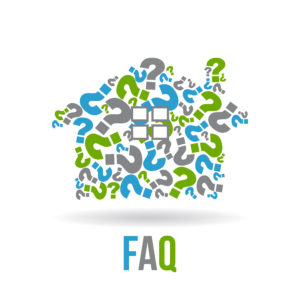Real estate is a complicated, multifaceted industry that is full of quirks. There are processes and phrases that come up within the process, and it can be overwhelming to navigate.
Here are a few common real estate FAQs—some answers to the questions that often come up throughout the process.
What’s the first step to buy a house?
Step one of the home-buying process is to meet with a lender. The first step is to get pre-approved for a mortgage, whether it’s a private lending company, a bank, or a credit union. After applying and getting pre-approved, your lender will provide a pre-approval letter.
A pre-approval letter makes you a strong candidate for when it’s time to put an offer in on a house, but most importantly tells you the price range for properties that you can afford. It also gives you more information on how much you’ll need to provide for a down payment and closing costs. You can start your search with a real estate agent based on your budget, along with your list of wants and needs.
How long does it take to buy a house?
On average, the home-buying process takes about 10 to 12 weeks from start to finish, from the initial search to closing. After submitting an offer and the seller accepting and officially going under contract, the average time before closing is 30 to 45 days; this is under normal market conditions. Sometimes there are situations for extensions or expedited dates, such as with a cash buyer or a relocation.
What’s a seller’s vs. a buyer’s market?
You’ll often hear phrasing around whether it’s a seller’s or a buyer’s market. Both are advantageous in different ways and typically shift periodically, depending on location, the economy, and the housing market as a whole.
In a seller’s market, demand for homes is high, which means that the prices of houses are high. The seller has an advantage that they can list their house for more money and likely get more offers for their home. There are different reasons for a seller’s market, such as:
- The economy. When the economy is strong and more people can afford to own homes, the demand increases.
- Lower interest rates. With lower rates, more people can afford financing, especially first-time buyers.
- A spike in interest rates. Alternatively, if there’s a sharp increase, buyers who were hesitant or unsure might dive into the market, believing that rates will only continue upward.
- Low inventory. In places like the Roaring Fork Valley, the low inventory of available homes increases prices. High demand, low supply.
In a buyer’s market, home prices decrease because of reduced demand. Factors that contribute to a buyer’s market include:
- Economic disruption. If the economy drops, there’s often less demand for home-buying.
- Higher interest rates. If mortgage rates are higher and it’s less affordable to enter the housing market, then home prices tend to drop to meet the level of demand to be more appealing to potential buyers.
- A short-term drop in interest rates. If there’s a sudden dip, borrowers might rush to lock in their rate before rates go back up.
- High inventory. Sometimes new subdivisions can create a vacuum for older homes nearby, which lower their prices because they lack some of the newer amenities that are highly desired.
- Natural disasters. Events like flooding, a fire, or an earthquake can cause property values to drop in the areas they occurred.
How much money is needed for a down payment?
Though this is something that is best discussed with your lender, the average for down payments is around 11%. This average includes a mix of both first-time and repeat buyers.
Many buyers, especially first-time or veterans, opt to put down between 3 to 5% down. Several programs make this possible, such as the FHA, VA, or USDA loan options (though it’s worth noting that these programs tend to have specific requirements to qualify). Sometimes, repeat buyers also prefer to put less money down because they’d prefer to have more money in their bank, even if that means having a higher monthly payment.
Many conventional loans prefer buyers to put down 20% of the home’s total price for payment. Many lenders will accept lower down payments but will charge a monthly fee known as private mortgage insurance (PMI) until that 20% is paid in equity.
Have any questions?
If you’d like to learn more about the home-buying process, connect with the team at Sopris Realty today. Contact us online or give us a call at 970-945-7677.

